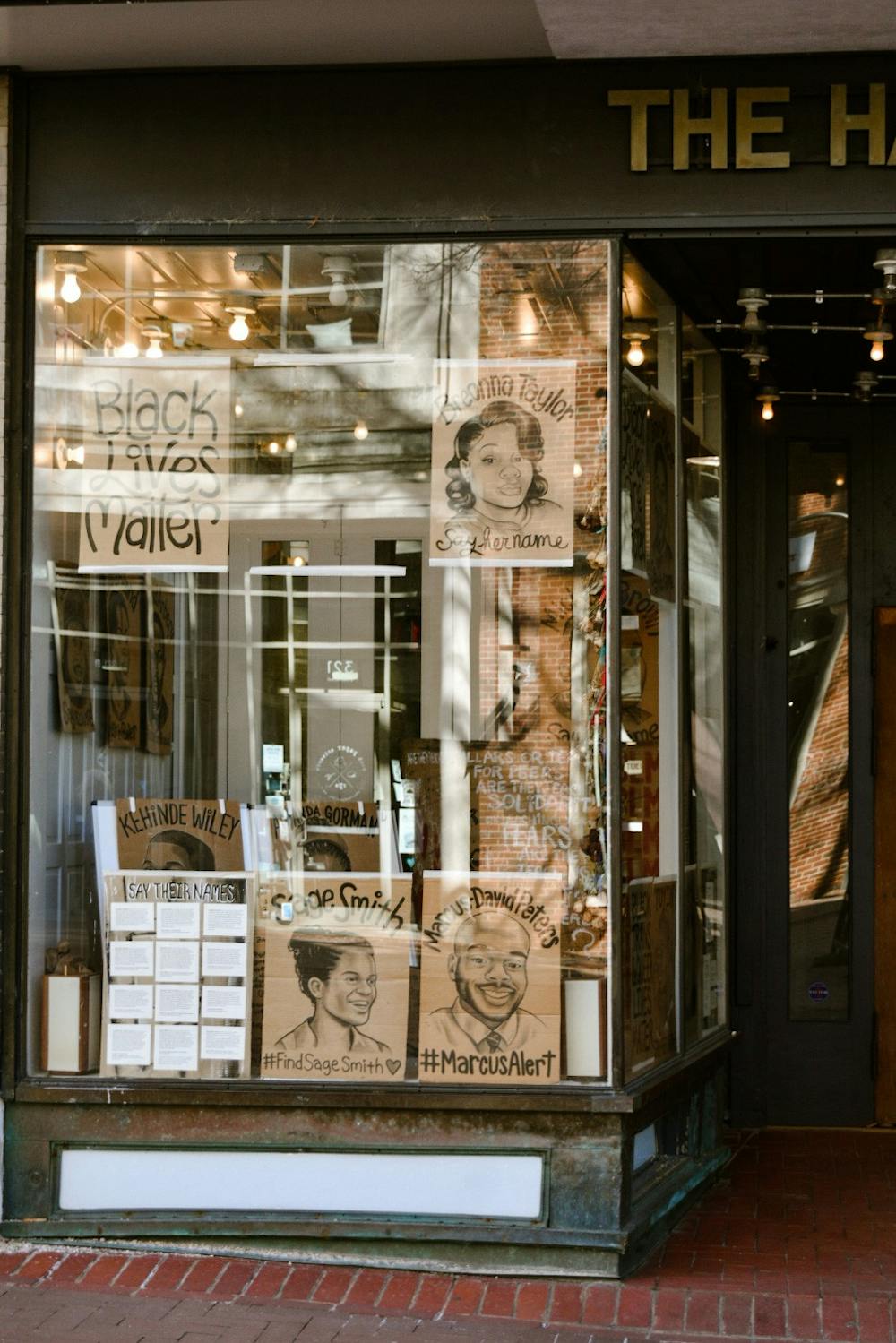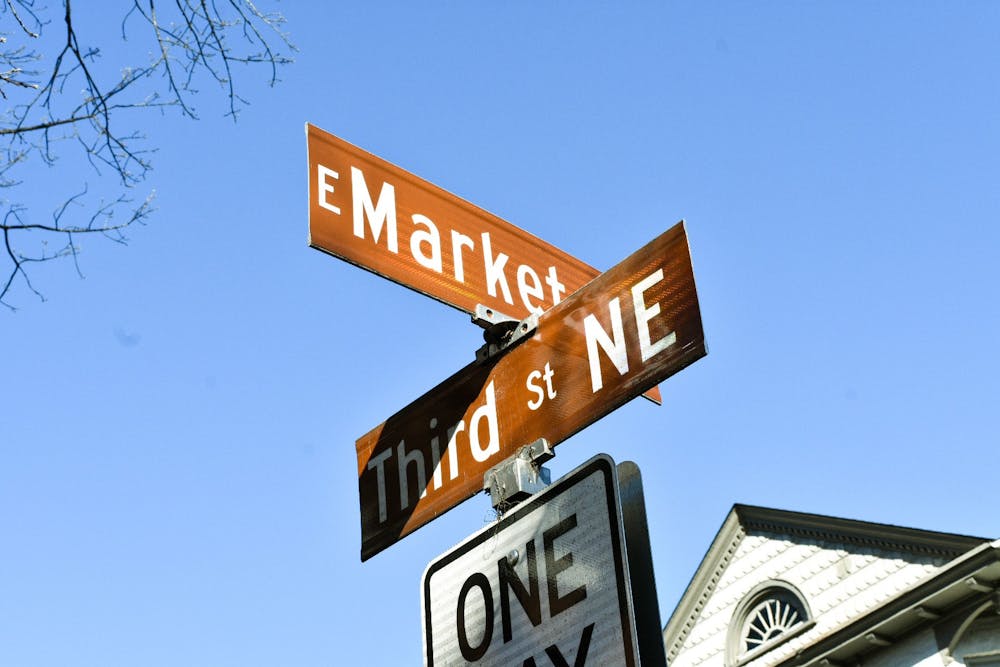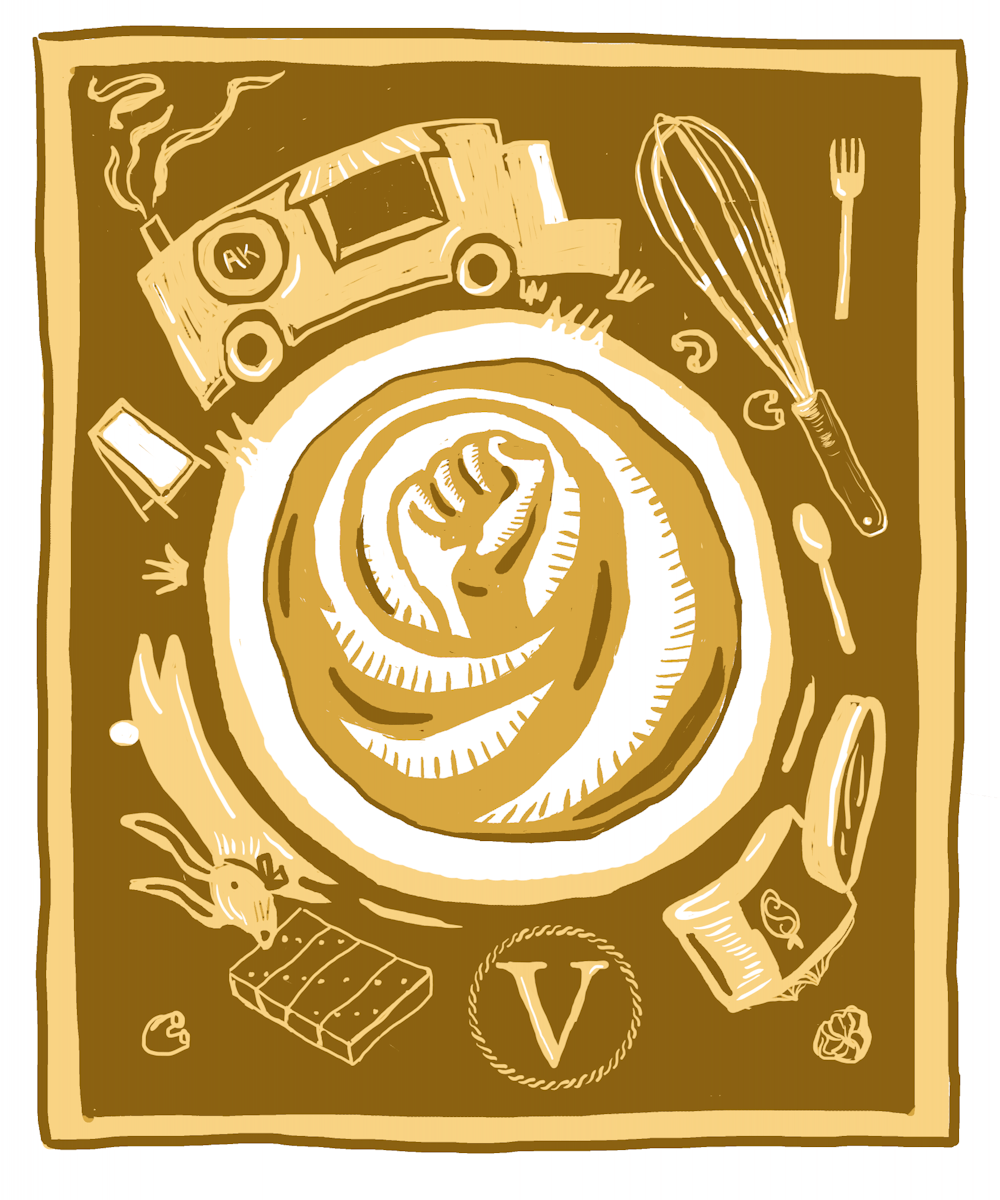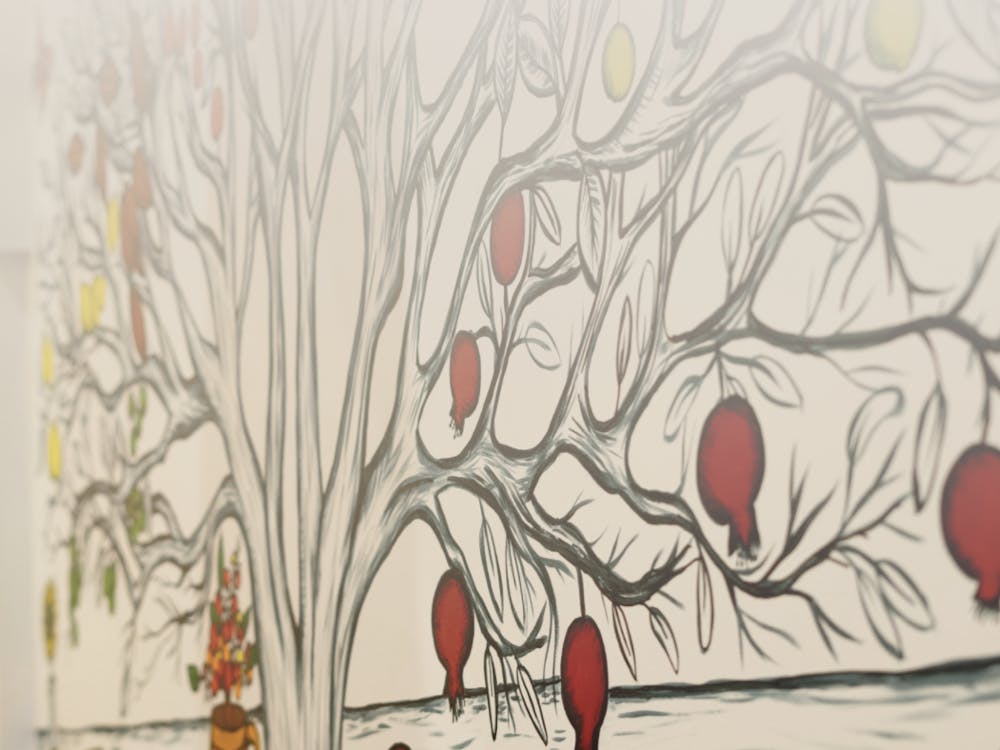Every morning, Angelic Jenkins starts her day by preparing batches of mac and cheese, collard greens and fried fish. Once she opens her food truck, Angelic’s Kitchen, at 11 a.m., she and her husband will sell her famous fried fish, hushpuppies and sides until they close at 7 p.m. Her business is the result of years of work. Jenkins — whose business started as a festival booth — has slowly expanded her cooking from one festival to 20 festivals. She then began to cater before moving to working full-time in her food truck.
Today, she sells her famous chicken, fish and hush puppies from both her food truck and a restaurant location opened in the fall. Jenkins has spent years building her business, and her success is evident by the popularity of her business within the Charlottesville area.
But being an entrepreneur is hard, and any business owner will tell you that they have faced challenges starting and maintaining their business.
“[You need] a lot of patience — Rome wasn't built in a day,” SheaMango owner Cordell Fortune said.
Fortune sells body butter — a product his wife, Christina, has been making and using for years.
Fortune has worked tirelessly to build the skills he needed to sustain his successful business. He took entrepreneurship courses through Charlottesville City — such as the Minority Business program — and the University's iLab for start-ups. After participating in workshops, festivals and incubator programs, he was able to establish himself as an entrepreneur and now sells his products online, though he did also sell at vendor shows before the pandemic.
“If you really believe in what you do, then you'll get joy out of that alone,” Fortune said.
While Fortune was able to fully dedicate himself to his business, many entrepreneurs can not bare the risk of taking on a new business without working another job at the same time. Take Jenkins for example — when first starting her business, she had to work full time while only operating her food truck on weekends. During festival season in the spring and summer months, she would typically travel to a different festival or fair every weekend.
“It’s tough [because] you're stuck in the middle,” Jenkins said. “If I quit my job, I can work on my business, but then [if] my business fails … then I won't have the income that I would normally get every two weeks from my job.”
But 2020 brought entrepreneurs one of their biggest obstacles yet — the pandemic.
Not only was Jenkins furloughed from her full-time job, but all of the festivals and catering events that she had booked were canceled. She decided to open her food truck full time, but she did not have the employees or the technology to smoothly make the transition to curbside pickup.
“I had a hard time placing my orders at first because I didn't have the income,” Jenkins said.
In the end, she was able to set up the necessary systems to support online ordering, but not without a steep learning curve. But Jenkins, of course, was not the only entrepreneur affected by the pandemic.
“COVID has hurt us,” said Jason Becton, the owner of MarieBette Cafe and Bakery. The local business sells fresh bread, pastries and brunch items.

Courtesy Ava Proehl
After selling his childhood home in New Jersey, Becton and his husband opened MarieBette on Preston Avenue in Charlottesville in 2014. In 2018, they opened another location, Petite MarieBette, near the Downtown Mall. They moved to Charlottesville to be close to family and now spend most of their waking hours managing their two restaurants while also caring for their two elementary-aged children after whom the stores are named.
“Our business, year by year, it’s just been doing … better and better,” Becton said. “Before COVID we had a little bit over 60 [employees] … We were able to expand to a downtown location.”
But then, during spring break, some friends of theirs told them that University was probably not going to have students come back or delay them coming back.
University students are an essential consumer base for MarieBette, and while the return of students to Grounds this past fall helped to boost business, the loss of in-person graduation and parents’ weekend meant the cafe lost critical income.
In March of 2020, as it became more apparent how COVID-19 was going to impact the community, Becton and his husband started by prioritizing sanitation, but they still had concerns about safety.
“It still didn't feel safe, so we decided to close the dining room,” Becton said. “That meant that I didn't have a job for all my servers and my food runners. Our wholesale clients started to drop off because they were closing or they were cutting back.”
To offset the loss of dining room business, MarieBette decided to focus on takeout and curbside pickup.
“Things are scary,” Becton said. “Figuring out how to pivot from doing sit down dining to doing only take out was really difficult because it's not what our business was planned to do … But our number one goal was under no circumstances can we close.”
Virtually every business in Charlottesville was hurt by COVID-19, and their ability to survive relied on many of the same adjustments that MarieBette had to make, regardless of the products or services that they provide.
Before the pandemic hit, Cordell Fortune’s sales had primarily come from vendor shows, but due to the pandemic, all were canceled. For example, a vendor show he founded called the Fortune Shop Pop Up — which allowed Black-owned businesses to set up for free — was canceled. The event, which was established in September of 2019 and intended to occur once a month for the entirety of 2020, sought to showcase entrepreneurial diversity and promote Black-owned businesses.
“We missed out on the physical tasks of being in front of customers,” Fortune said. “But it also gave us a chance to pivot to online driving … and that pivot wasn't too far off. [Our] website and Instagram page and Facebook page were already set up.”
But it was not just vendor shows that were canceled — even large companies like Whole Foods eliminated product demonstrations where businesses could come in and hand out samples. For Allens Scottish Shortbread owner Anwar Allens, this was a huge market loss.
Allens — a wholesale vendor of shortbread — bakes with a recipe originally developed by his wife’s grandmother. His business started with a small kitchen sharespace that enabled them to sell their product at three different farmer’s markets per week. Over the years, the business’s client base grew to include major retailers such as Whole Foods.
When the pandemic hit, Allens and his wife, Laura, shifted their focus to social media as a new way of engaging customers, and Allens was quick to point out the importance of the Charlottesville community in easing some of the pressure of the pandemic.
“[The Charlottesville community goes] out of [its] way to intentionally support local [businesses] when it's a hard time,” Allens said. “People will go out of their way to pay the extra $2 to see that company flourish.”
Despite the support of Charlottesville residents though, some business owners felt that the city of Charlottesville failed to provide much-needed support to small business owners.
“There were initial grants that [the City] was offering that was supposed to be $1,000, which is not a whole lot, but whatever it takes, so we applied,” Becton said. “They had so many applications that they closed the grant application process [after] less than 24 hours, and they also cut the grant from $1,000 to $500.”
The largest grant provided by the City, called the Small Business Relief Grant, was open for four days in July and offered a maximum of either $5,000 or $10,000 depending on the size of the business. For most business owners though, this is supplemental funding with little long-term value. As of now, the City has not received the state or federal funding to have offered another grant program.
Not only has the local government struggled to provide vital assistance, but many felt the CARES Act — a federal congressional bill originally passed in March which allocated $349 billion to small business relief — also failed to deliver. As the Small Business Administration — the federal agency responsible for allocating the funds — took loan requests, small business owners found that they received significantly less than what they asked for, even after weeks of waiting.
Later, in early August, the SBA’s most utilized program — the paycheck protection program, which offered forgivable loans to small businesses — expired. From August until December, the SBA only offered low-interest disaster loans and debt relief on specific types of loans. In addition, the expiration of the CARES Act on Dec. 26 of 2020, which eliminated extended unemployment benefits, has resulted in decreased business, as fewer people could afford to eat out and support local restaurants and businesses.
This past December, the PPP, unemployment benefits and a variety of other small business protections were renewed after the passage of a second COVID-19 relief package. PPP benefits began being distributed again in early January though with far harsher restriction — like those which originally included having to prove a minimum 25 percent drop in revenue compared to 2019. While businesses can apply for disaster loans, debt relief and bridge loans late into 2021, the PPP will, once again, expire in March.
Despite the pandemic’s crippling effect on many small businesses, Jenkins pointed out that the Black Lives Matter movement has alleviated some difficulties for small Black-owned businesses.

Courtesy Denise Brookman-Amissah
“People are trying to support Black-owned businesses, and I’ve seen that because my business has tripled,” Jenkins said. “A lot of people are offering support. For example, someone offered to take free photos of my food for me for better marketing. I got some support from the local news stations to help get my name out there. I think people are starting to recognize some of the small Black-owned businesses, which is really important.”
All of the aforementioned Black business owners reported similar upticks in sales during Black Lives Matter protests last summer.
“People have been wanting to do something.” Allens said. “Not everybody that cares about the quality of Blacks, the quality of brown-skinned people and disenfranchised people is out there in the streets. If [they] can't go out there and do that, then what else can [they] do?”
According to Allens, people have turned to minority business owners, who are historically marginalized, to create impact.
“[Consumers] have known about this, and [they] haven’t done anything, but now what [they] want to do is say to [themselves], ‘Did I do something in this season of change, reform and justice?’” Allens said. “Did I do something to stand up?”
At MarieBette, Becton and his husband began to use Black Lives Matter stencils on their bread to show their support of the movement.
“We have had a lot of support, but we've also had people who've been very disappointed that we are supporting a ‘terrorist organization’ on our bread,” Becton said. “It's kind of funny because most of the time people that complain, they're not gonna complain to me. They're gonna complain to somebody who's white.”
As the Black Lives Matter movement brought into question this nation’s policing and justice systems, it also brought greater attention to the systemic struggles that Black people face in creating wealth and opportunity for themselves and their communities.
Starting a business is one of the few ways to create wealth for oneself and one’s family, and entrepreneurship provides employment opportunities, business to suppliers and products to customers.
However, the path to becoming an entrepreneur is littered with obstacles that are often wider and steeper for Black people.
One of the biggest barriers that Black Americans face in creating a business is funding. Many prospective business owners do not have family members or the community connections to support their venture, so they have to turn to banks to receive loans. However, these loans are often inaccessible due to issues of discrimination and insuffience financial knowledge.
“You can look at [the CARES Act] loans that came out,” said Sarad Davenport, the manager and digital strategist for Vinegar Hill Magazine. “They were designed for small business owners, but what it revealed is that there is a poor system around access to capital and that system needs to be revised so that [small business owners] can have more streamlined access to capital.”
Davenport works for Vinegar Hill Magazine, a literary magazine that has focused on highlighting marginalized communities in Charlottesville and surrounding areas for the past 10 years. They have also expanded to include a clothing line. Notably, one of their current clothing lines is a collaboration with Zyahna Bryant, a local community organizer and second-year College student.

Courtesy Denise Brookman-Amissah
The name of the Vinegar Hill Magazine offers a poignant example of the historic barriers Black Charlottesville residents have faced. Vinegar Hill was a thriving Black neighborhood and business hub in the mid-1900s, but it was bulldozed by the City of Charlottesville in the name of “urban renewal,” a term often used to describe municipalities clearing out inner city areas to make room for upper class housing and high-end businesses often at the expense of minority communities. Eddie Harris, the founder of Vinegar Hill Magazine, chose to name the magazine after the area “to lift up and commemorate that community and to also foster that entrepreneurial spirit,” Davenport said.
While explaining the issues small business owners face in securing financial support, Davenport emphasized that loans are just one piece of larger puzzle. Grants from the City are essential as they provide funding that does not need to be paid back. Davenport also identified venture capitalists and investors as other sources of capital to which Black communities often do not have access. These investors, who provide businesses with start-up money and long-term financial support, are often implicitly biased against entrepreneurs of color and are unable to see the potential of their business.
“Venture capitalists are not taking chances on Black and other minority companies,” Davenport said. “We need to have more venture capital in this space. Not only that, I think more people of color need to enter the venture capital space.”
However, capital is not useful unless one has the rudimentary knowledge and mentorship to start a business.
“My husband worked for this woman, and the experience of opening up a restaurant with her was extremely important for our being able to open up a restaurant,” Becton said. “There aren't a whole lot of Black-owned businesses in Charlottesville, and it's hard to find good mentors.”
Mentors can provide technical assistance in terms of taxes, financial accounting and business management, but they also act as role models, demonstrating to others within their community that entrepreneurship is accessible to everyone.
“If you are at least allowed to see somebody have a go at it, then you can say to yourself, maybe one day I can do it,” Anwar Allens said.
Starting a business is a huge risk, and simply being exposed to others who are taking that risk can provide invaluable courage. Each business owner interviewed for this piece recognized their role as a role model and mentor within the Charlottesville community.
“To me, simply participating in [vendor] events and being the first African American in some of these events is breaking down barriers,” Fortune explained.
Nonprofits in Charlottesville are working to bridge these gaps by connecting prospective entrepreneurs to the necessary mentorship and capital. The United Way of Greater Charlottesville is one of those organizations. It provides grants to minority-owned businesses and currently has a partnership with the Virginia 30 Day Fund to provide grants to help sustain small businesses during the pandemic.
Similarly, the Charlottesville Investment Collaborative aims to support under-resourced entrepreneurs by providing networking opportunities, start-up investment and training workshops. Their largest program is a 16-week entrepreneurship workshop, after which participants get paired with a mentor and can apply for micro-loans.
It is groups like CIC that close the gaps between capital and mentorship that often prevent members of marginalized communities from starting their own businesses.
“A lot of the loans [CIC provides] are loans that a bank or traditional funding source would never come close to,” said Waverly Davis, the director of communications and engagement at CIC. “We've done about more than a million dollars in loans, and with all that is happening with COVID, our loan portfolio has grown super fast.”
Recently, the CIC secured funding from the City of Charlottesville to provide grants of up to $4,000 to support small businesses through the COVID-19 crisis. These grants seek to target businesses that employ a significant number of Charlottesville residents or are located in low-income areas.
Entrepreneurs who have gone through CIC’s 16-week workshop, they are then paired with a mentor for six months. However, as Davis emphasized, these relationships often continue far past their 6-month commitment.
“Entrepreneurship can be so isolating, and entrepreneurs often feel alone in their entrepreneurial journey,” Davis said. “We give [them] an opportunity to connect with others who are in the same situation. I think it's really important for entrepreneurs to have folks they can brainstorm with, that they can troubleshoot challenges with or that they can ask for various types of support.”
CIC is successful in what it’s set out to do — both Jenkins and Fortune went through CIC’s entrepreneurship workshop, and Becton has volunteered as a mentor. According to Davis, this success is because of the connections and support the Collaborative offers to all of its participants.
The technical education that the CIC offers is also valuable. The 16-week workshop helps entrepreneurs with not only large picture items like developing a business plan and customer base, but also minute things like accounting and taxes.
“We help make entrepreneurship and business ownership more attainable from the beginning,” Davis said.
Davis clearly cherished Charlottesville’s abundance of small businesses — which she saw as a key component of the City’s charm and ambiance.

Courtesy Denise Brookman-Amissah
“I think that small businesses are a huge piece of economic vibrancy and economic diversity,” Davis said. “They provide an experience to people living in the community to be able to engage with small businesses of all backgrounds, all colors and all offerings.”
Unfortunately, CIC isn’t able to address all of the challenges that minority and Black business owners face. On top of generational struggles around capital and mentorship, Black business owners are often underestimated and stereotyped.
“Sometimes when I go in to drop off the shortbread, and they say ‘tell the owners that I really love their shortbread,’” Allens said. “Sometimes I don’t even care, but sometimes I tell them that I’m the guy that bakes it….Most of the time, they will just say, ‘I love [your shortbread] so much.’ Because we are in 2020, it’s not too far-fetched for a brother to be making shortbread.”
Black Americans disproportionately experience microaggressions in which they are treated with less respect and less courtesy by others. A recent survey by Gallup reported that 32 percent of Black adults are regularly treated as lesser by another person compared to 21 percent of Latinx adults and 17 percent of Asian adults. While microaggressions are often unconscious actions, their impact is not lessened by their intent.
Like Allens, Becton also described having experienced microaggressions.
“There are times where people will come in, and they don't believe I'm the owner,” Becton said. “Or if I have people coming in, I'll greet them, and they'll look beyond me and look to speak to one of my white employees. Most of the time, I don't let it get to me, but they are these little kinds of injuries.”
Allens’ and Becton’s experience is common among Black business owners. Wholesalers and consumers are sometimes surprised or confused to see a Black-business owner, especially when the product or service they are providing isn’t historically supplied by Black people. These microaggressions can be detrimental to mental and physical health.
While Black entrepreneurs, with the help of supporters like the CIC, are working to overcome the barriers they face, it is clear that there is still more progress to be made. In spite of these challenges, the achievements these business owners have seen are all the more impressive. These entrepreneurs have been able to surpass barriers of intergenerational wealth disparities and racism to establish successful and long-lasting businesses.
While their specific experiences are varied and unique, they all share a deep love and passion for their work.
“It's been hard, it hasn't been easy,” Jenkins said. “But it's been fun and this is what I enjoy — it’s what makes me happy. So, I'm in it for the long run, there's no stopping here. I didn't realize I would be where I'm at today.”
When asked what they would tell other aspiring entrepreneurs, they emphasized that same passion.
“Don't be afraid if this is something that you truly believe in,” Fortune said. “Not everybody is ready to be an entrepreneur, but if you feel it, go for it.”







